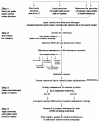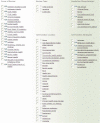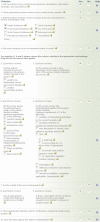A knowledge management tool for public health: health-evidence.ca
- PMID: 20718970
- PMCID: PMC2936422
- DOI: 10.1186/1471-2458-10-496
A knowledge management tool for public health: health-evidence.ca
Abstract
Background: The ultimate goal of knowledge translation and exchange (KTE) activities is to facilitate incorporation of research knowledge into program and policy development decision making. Evidence-informed decision making involves translation of the best available evidence from a systematically collected, appraised, and analyzed body of knowledge. Knowledge management (KM) is emerging as a key factor contributing to the realization of evidence-informed public health decision making. The goal of health-evidence.ca is to promote evidence-informed public health decision making through facilitation of decision maker access to, retrieval, and use of the best available synthesized research evidence evaluating the effectiveness of public health interventions.
Methods: The systematic reviews that populate health evidence.ca are identified through an extensive search (1985-present) of 7 electronic databases: MEDLINE, EMBASE, CINAHL, PsycINFO, Sociological Abstracts, BIOSIS, and SportDiscus; handsearching of over 20 journals; and reference list searches of all relevant reviews. Reviews are assessed for relevance and quality by two independent reviewers. Commonly-used public health terms are used to assign key words to each review, and project staff members compose short summaries highlighting results and implications for policy and practice.
Results: As of June 2010, there are 1913 reviews in the health-evidence.ca registry in 21 public health and health promotion topic areas. Of these, 78% have been assessed as being of strong or moderate methodological quality. Health-evidence.ca receives approximately 35,000 visits per year, 20,596 of which are unique visitors, representing approximately 100 visits per day. Just under half of all visitors return to the site, with the average user spending six minutes and visiting seven pages per visit. Public health nurses, program managers, health promotion workers, researchers, and program coordinators are among the largest groups of registered users, followed by librarians, dieticians, medical officers of health, and nutritionists. The majority of users (67%) access the website from direct traffic (e.g., have the health-evidence.ca webpage bookmarked, or type it directly into their browser).
Conclusions: Consistent use of health-evidence.ca and particularly the searching for reviews that correspond with current public health priorities illustrates that health-evidence.ca may be playing an important role in achieving evidence-informed public health decision making.
Figures









Similar articles
-
Missing and accounted for: gaps and areas of wealth in the public health review literature.BMC Public Health. 2011 Oct 3;11:757. doi: 10.1186/1471-2458-11-757. BMC Public Health. 2011. PMID: 21967658 Free PMC article. Review.
-
Do evidence summaries increase health policy-makers' use of evidence from systematic reviews? A systematic review.Campbell Syst Rev. 2018 Sep 10;14(1):1-52. doi: 10.4073/csr.2018.8. eCollection 2018. Campbell Syst Rev. 2018. PMID: 37131376 Free PMC article.
-
Beyond the black stump: rapid reviews of health research issues affecting regional, rural and remote Australia.Med J Aust. 2020 Dec;213 Suppl 11:S3-S32.e1. doi: 10.5694/mja2.50881. Med J Aust. 2020. PMID: 33314144
-
The future of Cochrane Neonatal.Early Hum Dev. 2020 Nov;150:105191. doi: 10.1016/j.earlhumdev.2020.105191. Epub 2020 Sep 12. Early Hum Dev. 2020. PMID: 33036834
-
Effectiveness of Technology-Enabled Knowledge Translation Strategies in Improving the Use of Research in Public Health: Systematic Review.J Med Internet Res. 2020 Jul 31;22(7):e17274. doi: 10.2196/17274. J Med Internet Res. 2020. PMID: 32735231 Free PMC article.
Cited by
-
The global stock of research evidence relevant to health systems policymaking.Health Res Policy Syst. 2013 Sep 4;11:32. doi: 10.1186/1478-4505-11-32. Health Res Policy Syst. 2013. PMID: 24007378 Free PMC article.
-
Missing and accounted for: gaps and areas of wealth in the public health review literature.BMC Public Health. 2011 Oct 3;11:757. doi: 10.1186/1471-2458-11-757. BMC Public Health. 2011. PMID: 21967658 Free PMC article. Review.
-
How can knowledge exchange portals assist in knowledge management for evidence-informed decision making in public health?BMC Public Health. 2014 May 12;14:443. doi: 10.1186/1471-2458-14-443. BMC Public Health. 2014. PMID: 24884530 Free PMC article. Review.
-
A process evaluation accompanying an attempted randomized controlled trial of an evidence service for health system policymakers.Health Res Policy Syst. 2015 Dec 12;13:78. doi: 10.1186/s12961-015-0066-z. Health Res Policy Syst. 2015. PMID: 26652277 Free PMC article.
-
Knowledge management tools and mechanisms for evidence-informed decision-making in the WHO European Region: a scoping review.Health Res Policy Syst. 2023 Oct 31;21(1):113. doi: 10.1186/s12961-023-01058-7. Health Res Policy Syst. 2023. PMID: 37907919 Free PMC article.
References
-
- National Forum on Health. Canada Health Action: Building on the Legacy. Ottawa; 1997.
-
- Lomas J, Culyer T, McCutcheon C, McAuley L, Law S. Conceptualizing and combining evidence for health system guidance: Final report. Canadian Health Services Research Foundation; 2005.
-
- Revere D, Turner AM, Madhavan A, Rambo N, Bugni PF, Kimball AM, Fuller SS. Understanding the information needs of public health practitioners: A literature review to inform design of an interactive digital knowledge management system. Journal of Biomedical Informatics. 2007;40:410–421. doi: 10.1016/j.jbi.2006.12.008. - DOI - PubMed
Publication types
MeSH terms
Grants and funding
LinkOut - more resources
Full Text Sources
Research Materials

